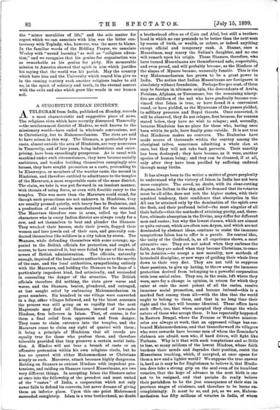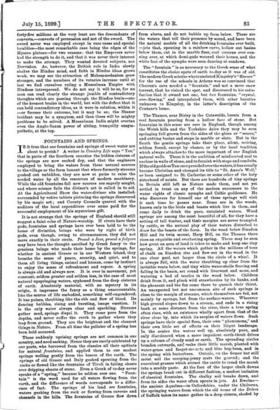A SUGGESTIVE INDIAN INCIDENT.
ATELEGRAM from India, published on Monday, records a most characteristic and suggestive piece of news. The religious riots which have recently distracted Tinnevelly
—the southernmost district of Madras, AO well known to the missionary world—have ended in wholesale conversions, not to Christianity, but to Mahommedanism. The riots are said to have arisen in this way. The Shanars, a particularly low caste, almost outside the area of Hindoism, are very numerous in Tinnevelly, and of late years, being industrious and enter-
prising, have been exceedingly prosperous. As is usual with mankind under such circumstances, they have become socially ambitions, and besides building themselves annoyingly nice houses, they have sought promotion as a caste, pretending to be Blisetreyos, or members of the warrior caste, the second in Hindoism, and therefore entitled to admittance to the temples of the Maravars, a most respectable caste of the same district. The claim, we take it, was put forward in an insolent manner, with threats of using force, or even with forcible entry to the temples. This was more than the Maravars could stand, for though such promotions are not unknown in Hindoism, they are usually pressed quietly, with heavy fees to Brahmins, and a production of old records manufactured for the occasion. The Maravars therefore rose in arms, called up the bad characters who in every Indian district are always ready for a row, and set themselves to beat and plunder the Shamus. They wrecked their houses, stole their jewels, flogged their women and tore jewels out of their ears, and generally con- ducted themselves like soldiers in a city taken by storm. The Sbanars, while defending themselves with some courage, ap- pealed to the British officials for protection, and ought, of course, to have received it, but were foiled by one of the weak- nesses of British administration. The officials, naturally enough, inquired of the local native authorities as to the merits of the case, and the local authorities, sympathising entirely with the Maravars, and holding the Shanars to be dogs of a particularly impudent kind, lied artistically, and succeeded in concealing the danger of the situation. The British officials therefore did nothing, the riots grew worse and worse, and the Shanars, beaten, plundered, and outraged, at last sought relief by embracing Mahommedanism in great numbers. Six hundred in one village were converted in a day, other villages followed, and by the latest accounts the process was still going on so rapidly that the next Magistrate may find all Shanars, instead of low-caste Hindoos, firm believers in Islam. That, of course, is for them a final relief from oppression and from danger. They cease to claim entrance into the temples, and the Maravars cease to claim any right of quarrel with them ; it being a principle of Hindoism that all creeds are equally true for those who profess them, and therefore tolerable provided that they preserve a certain social isola- tion. A Hindoo will not bear a breach of caste or an offensive pretension within his own religions circle, but he has no quarrel with either Mahommedans or Christians simply as such. Moreover, attack becomes highly dangerous. Raiding on Shanars as outcast Hindoos with impudent pre- tensions, and raiding on Shanars turned Mussulmans, are two very different things. In accepting Islam the Shanars enter at once into the fellowship of the proudest and most united of the "castes" of India, a corporation which not only never fails to defend it converts, but never dreams of giving them an inferior place. Upon this one point Mahommed succeeded completely. Islam is a true brotherhood, no doubt a brotherhood often as of Cain and Abel, but still a brother- hood in which no one pretends to be better than the nett man
by reason of birth, or wealth, or colour, or indeed anything except official and temporary rank. A Shanar, once a Mussulman, may marry the Sultan's daughter, and no one will remark upon his origin. Those Shellfire, therefore, who have turned Mnssulmans are thenceforward safe, respectable, and even proud, and will probably become, as the Hindoos of the slopes of Mysore became, unusually fanatic. This is the way Mahommedanism has grown to be a great power in India. The notion that Indian Mussalmans are foreigners is absolutely without foundation. Perhaps five per cent. of them may be foreign in ultimate origin, the descendants of Arabs, Persians, Afghans, or Turcomans, but the remaining ninety- five are children of the soil who have gradually become con- vinced that Islam is true, or have found it a convenient creed, or have yielded, as the Mysoreans of the passes yielded, to military pressure and Royal threats. Once converted, it will be observed, they do not relapse, first because, for reasons stated below, they have no wish to relapse; and, secondly, because Hindoism has no place for those who, having once been within its pale, have finally gone outside. It is not true that Hindoism makes no converts. The Brahmins have made scores of thousands within the century among the aboriginal tribes, sometimes admitting a whole clan at once, but they will not take back perverts. Their sanctity has been destroyed ; they have become, as it were, another species of human being ; and they can be cleansed, if at all, only after they have been purified by suffering endured through many births.
It has always been to the writer a matter of grave perplexity to understand why the victory of Islam in India has not been more complete. The creed, no doubt, with its clear-cutting dogmas, its Sultan in the sky, and its demand that its votaries must be all alike, does not suit the higher castes, with their mystical tendency, their confidence that absorption in the All can be attained only by the domination of the spirit over the flesh, and their profound belief—the most singular of all their beliefs—that the methods of attaining purity, and, there- fore, ultimate absorption in the Divine, may differ for different men and castes; bat why the lowest classes, which are almost or quite outcast, which are often non-Aryan, and which are not dominated by abstract ideas, continue to resist the immense temptations Islam has to offer is a puzzle. Its central idea, the unity of the Godhead, is, as all experience shows, a most attractive one. They are not asked when they embrace the faith, as they are asked when they become Christians, to cease to be Asiatics,—to accept a new morality, new methods of household discipline, or new ways of guiding their whole lives down to their very diet. They are not told to suppress their passions, to give up hating, to throw away the immense protection derived from belonging to a powerful corporation with iron social rules. They are, in the main, left where they were, save for a change in opinion, in return for which they enter at once the most potent of all the castes, receive immense social promotion, and become imbued—this is a marked fact among them all—with the idea that the world ought to belong to them, and that in no long time their right and the fact will become identical. These offers have such effect, too, that when accepted they change the whole nature of those who accept them. It has repeatedly happened in Eastern Bengal, where the Ferazee or Wahabee mission- aries are always at work, that an oppressed village has em- braced Mahommedanism, and that thenceforward its villagers who were cowards have become men of whom the Zemindar's clubmen are afraid, men who, if hard driven, will fight like Pathans. Why is it that with such temptations and so little to lose, so many millions of the lowest Hindoos, whose faith burdens their minds and degrades their position, resist the Mussulman teaching, which, if accepted, at once opens for them a new and a lighter world ? We suppose the true answer is, hard as it may be for Englishmen to believe it, that Hindo- ism does take a strong grip on the soul even of its humblest votaries, that the hope of advance in the next birth is one not to be resigned, and that pariahs do really believe their pariahdom to be the just consequence of their sins in previous stages of existence, and therefore to be borne nu. complainingly. It must be so, and yet, as we see, Mahom- medanism has fifty millions of votaries in India, of whom
forty-five millions at the very least are the descendants of converts,--converts of persuasion and not of the sword. The sword never was employed except in rare cases and special localities—the most remarkable case being the edges of the Mysore plateau—for two reasons : that the Emperors never had the strength to do it, and that it was never their interest to make the attempt. They wanted devoted subjects, not Dervishes. As, however, the British rule in India slowly shakes the Hindoo mind, and faith in Hindoo ideas grows weak, we may see the attraction of Mahommedanism grow stronger, and the numbers of its votaries increase until at last we find ourselves ruling a Mussulman Empire with Hindoos- interspersed. We do not say it will be so, for no man can read clearly the strange jumble of contradictory thoughts which are passing through the Hindoo brain—one of the keenest brains in the world, but with the defect that it can hold contradictory ideas, as it were in solution, within it —or foresee their outcome, but it may be so; the Shanar incident may be a symptom, and then there will be mighty problems to be solved. A Mussulman India might overtax even the Anglo-Saxon power of sitting, tranquilly unsym- pathetic, at the top.







































 Previous page
Previous page